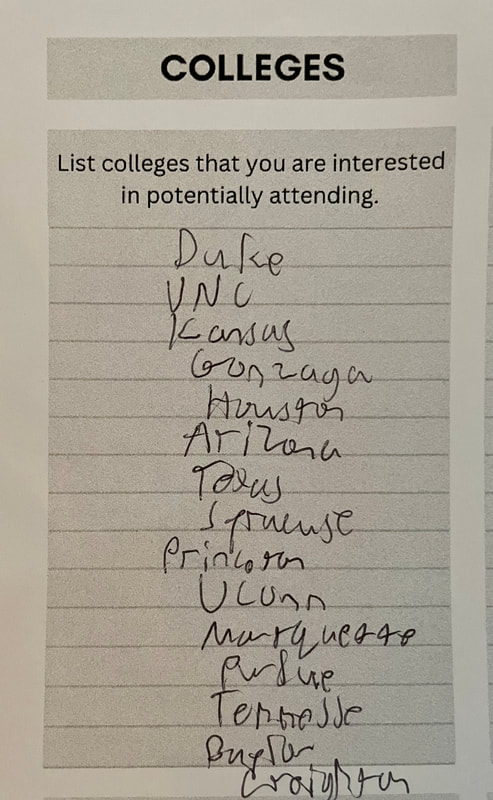|
To the high school Class of 2024, May 1st, College Decision Day, is a momentous occasion to celebrate the culmination of your hard work and dedication throughout your high school journey. Your commitment to your academic and personal goals is not just commendable, it's a testament to your resilience and determination. Today, we celebrate your achievements and look forward to your bright future as you embark on this exciting new chapter.
Traditionally observed on May 1st, College Decision Day is a pivotal moment in the college admissions process. After careful consideration and evaluation, it's the day when high school seniors in the United States submit their enrollment deposits and officially commit to the college or university that will shape their future. The origins of College Decision Day can be traced back to the early 2000s when various college access organizations and high schools began promoting the idea of a designated day for students to announce their college decisions. The goal was to create a sense of excitement and celebration around the college admissions process while encouraging students to make informed decisions about their future education. College Decision Day has transformed from a local initiative to a nationwide celebration. It's a testament to the hard work and preparation of high school seniors as they finalize their plans for higher education and a reflection of the collective effort of high schools, colleges, and communities across the country. College Decision Day is not just about submitting enrollment deposits. It's a day of pride and celebration, with students donning apparel or accessories representing their chosen college or university. Many schools organize special events, such as college signing ceremonies or pep rallies, to honor and applaud students for their achievements. While May 1st remains the traditional College Decision Day deadline, some colleges and universities offer flexibility by allowing students to request extensions or deferrals. This accommodation is particularly important during years with extenuating circumstances, such as the delays related to the FAFSA process or unforeseen events like the COVID-19 pandemic. To those still navigating their options, know that your journey is valid and there's still time to make the best decision for your future. For juniors eagerly anticipating their turn to embark on the college application journey, now is the perfect time to start laying the groundwork for a smooth and fulfilling senior year. This journey is not just about getting into college, it's about discovering your passions, honing your skills, and preparing for the next phase of your education. By starting now, you can alleviate stress related to applying to colleges and make the most of your high school experience. Research and Explore: Begin researching colleges and universities that align with your academic and personal interests. Take virtual tours, attend college fairs, and contact admissions counselors to gather information and insights. Utilize Your Summer: Do something academic, get a job, or help a community organization. Build Your Resume: Continue and deepen your involvement in extracurricular activities. Think about whether your involvement showcases your interests and talents. Whether joining clubs, volunteering, or pursuing internships, building a well-rounded resume will strengthen your college applications. Focus on Academics: Stay committed to your studies and strive for academic excellence. Maintaining strong grades and challenging yourself with rigorous coursework will demonstrate your readiness for college-level academics. Prepare for Standardized Tests: Consider taking standardized tests like the SAT or ACT. Study early and explore test prep options to ensure you're well-prepared for exam day. Start Drafting Personal Statements: Begin brainstorming and drafting your personal statement or college essays. Reflect on your experiences, aspirations, and values to craft compelling narratives that showcase your unique identity and perspective. By taking proactive steps now, juniors can set themselves up for success and enjoy a more seamless college application process in the year ahead. Congratulations again to all the seniors on this momentous occasion and best wishes to the juniors as they embark on their college journey! 🌟 #CollegeDecisionDay #Classof2025 #CollegeAdmissions
0 Comments
Recently, I attended a college counseling event with my freshman in high school. It was informative with opportunities for students (and parents) to ask questions and begin to think about college aspirations and their future as high school students. At the end of the evening, students were given a worksheet and asked to list their interests, extracurriculars, possible majors of study, and colleges of interest. My son and his friend were conferring as they wrote their list. They both were in sync, identifying the same colleges, and this task seemed to come quite easily. Based on my son’s GPA, he had some likely, match, and reach schools, as well as a few of what I call “wild cards,” schools that even though on paper he looks like he could be admitted, there are far too many competitive applicants to consider it more than a wild card or lottery.
As I studied the list more carefully, I noticed a pattern emerging…it was almost all the top ranked schools in NCAA college basketball and a couple of other colleges they theorized might make it to the Sweet Sixteen in the playoffs. I share this example to illustrate that students make college lists based on many factors, but this is one I had not previously considered. While unlikely to be the final list of colleges my son will apply to, it’s as good of a rationale as any to start building a list to explore. With high school juniors in some stage of creating or finalizing the list of schools where they will apply to college, it’s useful to consider the tapestry of influences that shape students' and parents' perceptions and preferences. External Influences: Students and parents frequently draw inspiration from various external sources when crafting their college lists. These may include:
Personal Factors: Individual experiences and aspirations also play a pivotal role in shaping college preferences:
Unconscious Influences: It's essential to recognize that many influences on college selection operate on a subconscious level:
Navigating the College Search: Despite the myriad of influences at play, students and parents must approach the college search process with intentionality and open-mindedness:
For high school and new college students, the question of what to major in can be daunting. It's a rite of passage to be undecided, and even those who enter college with unwavering certainty about their chosen major often find themselves on a winding path of change. The truth is, not having a clear major in mind is entirely appropriate at this stage of life. At age 18 or 19, students are still in the early stages of forming their identities, and there's a wealth of learning and growth ahead of them. This period of exploration and transformation is one of the fundamental goals of higher education.
Understanding the Role of a College Major College majors play a crucial role in higher education, providing depth and specialization in a student's chosen field. A major typically consists of ten or more courses within a specific academic discipline, ranging from introductory to advanced levels. While they make up roughly a third of a student's undergraduate degree, having a major is essential in fostering expertise and critical thinking in a particular area. In addition to major requirements, colleges often include core requirements encompassing a wide range of academic subjects and areas of interest. These requirements wrap around the major, providing students with a breadth of knowledge. Major and non-major requirements equip students with essential skills such as critical thinking, communication, advocacy, writing, and problem-solving, which transcend any specific field and are highly valuable in various careers. Some majors, like engineering or nursing, are more specialized and career-oriented, offering less room for broad education. These programs focus intensely on the chosen discipline, leaving only a small amount of the curriculum to study and explore other subjects. The exact balance may vary from one institution to another. Considering the Future: Careers and the Unknown It's natural and logical for students to consider future job prospects when choosing a major. College education comes at a significant cost, so it's reasonable to want that investment to pay off financially and lead to a rewarding career. However, avoiding viewing college education solely through a pre-professional lens is important. The reality is that the jobs of the future don't even exist today. Being educated in a broad range of areas, such as in a liberal arts educational experience, and possessing a diverse skill set is valuable preparation for a wide range of careers, including those that have yet to emerge. Supporting High School Students in Choosing a College Major There are numerous ways to support high school students as they navigate the process of choosing a major:
Choosing a College for Undecided Students When compiling a college list, it's crucial to consider schools that fit undecided students well. These institutions should offer support for exploring different majors and provide the flexibility to switch between majors if needed. The selection process should focus on finding schools that align with the student's needs, interests, and goals. A college's reputation, selectivity, or ranking should not be the sole criteria for inclusion. It's essential to ensure students can pursue their academic aspirations and explore a major of interest at each institution.
Undecided students interested in a highly competitive major such as computer science but with a range of other academic interests should consider applying as an undecided student. Sometimes, demonstrating a broad range of interests can lead to better admission outcomes. An Action Plan for Undecided College Students Once in college, undecided students should take advantage of the resources available to them:
Additional steps that students can take include:
In this journey of self-discovery, students should embrace uncertainty and remain open to new possibilities. College is not just about finding the right major; it's about students evolving as individuals, gaining skills, and discovering passions that will shape their future. As they walk their academic path, let them explore, ask questions, and embrace the changes that come their way. After all, the journey itself often leads to the most profound discoveries and rewards. Parents of seniors and older high school students, are your kids ready to live independently, fly from the comfort of your nest, and settle into their lives as confident, competent college students and young adults? Here’s a reality check...does your student have these essential "adulting" and daily living skills? If not, get busy! Summer can be an excellent time for teachable moments that last a lifetime.
To help your child learn these skills before going to college, you can:
In a recent article in Education Week on student well-being, U.S. Surgeon General Vivek Murthy points to social media as the major contributing factor in the surge in children's mental health challenges, and describes their declining mental health as the 'Crisis of Our Time.'
Self-regulation of social media use is a learned skill that has to be mindfully practiced. As a college advisor working with high school students, I'm experiencing more of my students making a conscious decision to set aside their social media, attending to it less, and trying to take a more objective view of what is available on social media. Just last night, a high school junior told me that she feels more positive about herself because she's decided not to be on social media very often. She told me that she realized she was wasting so much time and that she's happier when she uses her time in other ways. She also said that she feels it was toxic to her to be always looking at other people's achievements. She referred to it as being "filtered" and never showing anything negative or any true feelings. I love that she's able to separate herself and her experiences from what is portrayed on social media. A refreshing perspective in the article "Quietly Quitting the College Admissions Race" from author Brennan Barnard, "...I am not suggesting that young people disengage and passively refuse to go above and beyond. I am saying that learning to set boundaries early is a life skill that will serve them well on all fronts. Instead of packing schedules with a litany of “should dos,” students might consider what they really want to do–what fills and inspires them–and lean into those pursuits in moderation and purpose, not mania and pressure."
I recently started working with an inspiring, articulate, athletic, academically and service-oriented sophomore who already seemed to be subscribing to this mentality, very intentionally setting boundaries and prioritizing time for himself to rest, rejuvenate and relax. He talked a lot about it being important for him to incorporate these moments every day, whether it be taking a short nap, playing with his dog, going for an early morning surf or scrolling through social media. He doesn't seem stressed, but he is directed and contemplative, as well as being a straight A student, playing two sports, tutoring other students and increasing his engagement in new ways in his school and community. In my experience with adolescents, this is not the norm. The most frequent comments I hear are about wishing they had more free time, less demands, more of doing what they want to do instead of what their parents, teachers, coaches or others think they need to be doing. It's not that they really want to lounge, play video games, and hang out with friends all day long, but they do desire to feel more in control of their lives and future. The recent data from a Harvard-led study examining many indicators of life satisfaction and well-being found that young adults, age 18-25 report the lowest rates of satisfaction. This has not been historically true, our teens' lives, the expectations of them, and the pressure they place on themselves has changed over the last 20 years. As a parent, it is a fine line between encouraging, nudging, providing opportunity and pushing too far. Every child is different, every situation is different, but as adults, if many of us in society have decided to #quietlyquit the madness or at least prioritize stepping back a bit and caring for ourselves, then let's empower our youth to do the same. #collegeadvisor #collegecounselor #redowork #teenmentalhealth A parent of a client recently shared with me that she worried that the environment and educational experience at certain colleges might be not in line with her family values.
My role as a college advisor is not always about supporting and guiding the student but also about helping the parent to better understand the benefits of going to college, one of which is being able to listen to and learn from others’ perspectives, particularly those whose experiences and viewpoints are different from your own. Read this impactful article "These Professors Help Students See Why Others Think Differently," featured in The Chronicle of Higher Education to learn more about the role of college in broadening and deepening your student's experiences and perspectives. I was involved with a USC admissions visit at a local Los Angeles high school, and the representative asked the junior and senior students how many had ever visited the campus. Surprisingly, only 20% had actually been to the campus, and these were students who had self-identified as being interested in applying to USC!
Parents, take your students and younger children to college campuses and events, not because you're doing "official college visits" or planning for college, but because knowledge and perspective are gained from being on a college campus, observing what students do, what fun activities are offered, what a campus looks and feels like, and envisioning your future self as a college student, all the elements that help a student to understand what college is all about ~ besides academics and getting a degree. Do you know that most colleges and universities have a significant commitment to community engagement and offer a huge number of interesting and diverse experiences for children and families, many of which are absolutely free? These include: sporting events, performing arts, visual arts, notable speakers, book fairs, health fairs, food and restaurant nights, children's theater and concerts, planetariums, community gardens, and much, much more. What do students REALLY want to know? ….As students are doing campus tours, attending college fairs and engaging with college representatives at their high schools, I thought I’d share a few of the questions I’ve heard from students recently, most of which are not included in this great article, "50 Questions to Ask When You're on a College Visit". Notice how most of the students’ actual questions are not related to academics or formal education but to social aspects and daily living.
* What kind of food do you have or how many places can you get something to eat on campus? Does the little robot deliver to dorm rooms? * Is there Greek life? * What are the dorms like? How many people are in a room? * How do I get a roommate? * How far is it to a beach? * Do you consider your college and students to be more liberal or conservative? * What is there to do in your college town? * What activities are there for freshman to help them meet people? * How do students get around campus or to places in the city? * Can I double, triple major? Can I have 2 minors? * Can I change majors? * Does it rain/snow a lot? * How do I get involved in clubs or campus activities? Getting a college education isn't just about what courses you take, where you go, or even your instructors, it's as much about the social connections you make with your peers. Students who were surveyed about their attendance and engagement in coursework reported that they were more likely to attend when they had opportunities to interact with their classmates. They also viewed going to class as an opportunity to make friends. As highlighted in this article, these findings have implications for rethinking how colleges and faculty structure classes and opportunities for student engagement.
Check out this interesting read, "Why Students Are Skipping Class, and How to Bring Them Back," to learn more about what today's college students value. |
Archives
May 2024
Categories |





